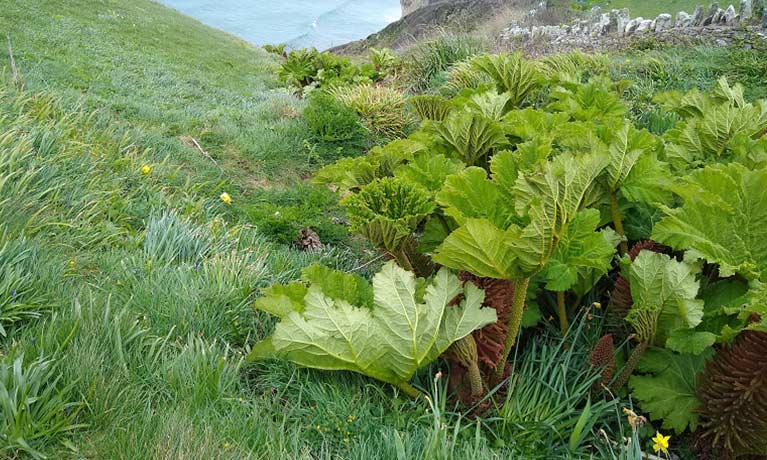Search
Coventry University researcher urges gardeners to join Plant Alert project

Giant Rhubarb spreading from a hotel garden into the coastal vegetation in the Pembrokeshire Coast National Park. Photo credit: Coventry University
Monday 15 June 2020
Press contact
Coventry University has teamed up with the Botanical Society of Britain and Ireland on a project calling on gardeners to help stop invasive plants from escaping their gardens.
Plant Alert is a citizen science project asking gardeners to use a web-based app to record problem plants before they spread into the wild.
Dr Katharina Dehnen-Schmutz, Associate Professor in Plant Ecology at the University’s Centre for Agroecology, Water and Resilience is a co-ordinator on the project.
In the Victorian era, well-meaning horticulturists introduced plants like Himalayan balsam and Japanese Knotweed to Britain.
The imported balsam still continues to swamp native riverside and woodland vegetation, while the alien knotweed can cause headaches for house-holders seeking insurance.
Plants like that have escaped from gardens into the wild and some are a major threat to native plant species in the British flora. They can have high negative impacts on ecosystems, biodiversity and the built environment.
Dr Katharina Dehnen-Schmutz, Associate Professor in Plant Ecology
That is why we want gardeners to help our work by reporting troublesome plants like Giant Rhubarb and Three Cornered Leek on Plant Alert. Gardeners are best placed to spot potential troublemakers - the plants that have to be controlled to prevent them from overgrowing other plants or spreading into parts of the garden where they are not wanted.
Traits which should set alarm bells ringing for gardeners include vigorous growth, prolific self-seeding, longer flowering periods and any plant which the gardener has to ‘keep on top of’ to prevent it spreading.
Bitter experience has shown that species that are invasive in gardens are also the ones that are likely to 'jump the garden fence' and cause problems in the wild; usually because they can regenerate very effectively and grow vigorously, outcompeting native species.
Dr Kevin Walker, Head of Science at the Botanical Society of Britain and Ireland
The most effective way to reduce the impacts of these species is to identify them before they escape into wild - this is exactly what this project aims to achieve.
Results so far, including the ten most frequently recorded invasive plants, are being tracked online as the team called on gardeners of all levels and experience to use this web-based app and report potentially invasive plants.




